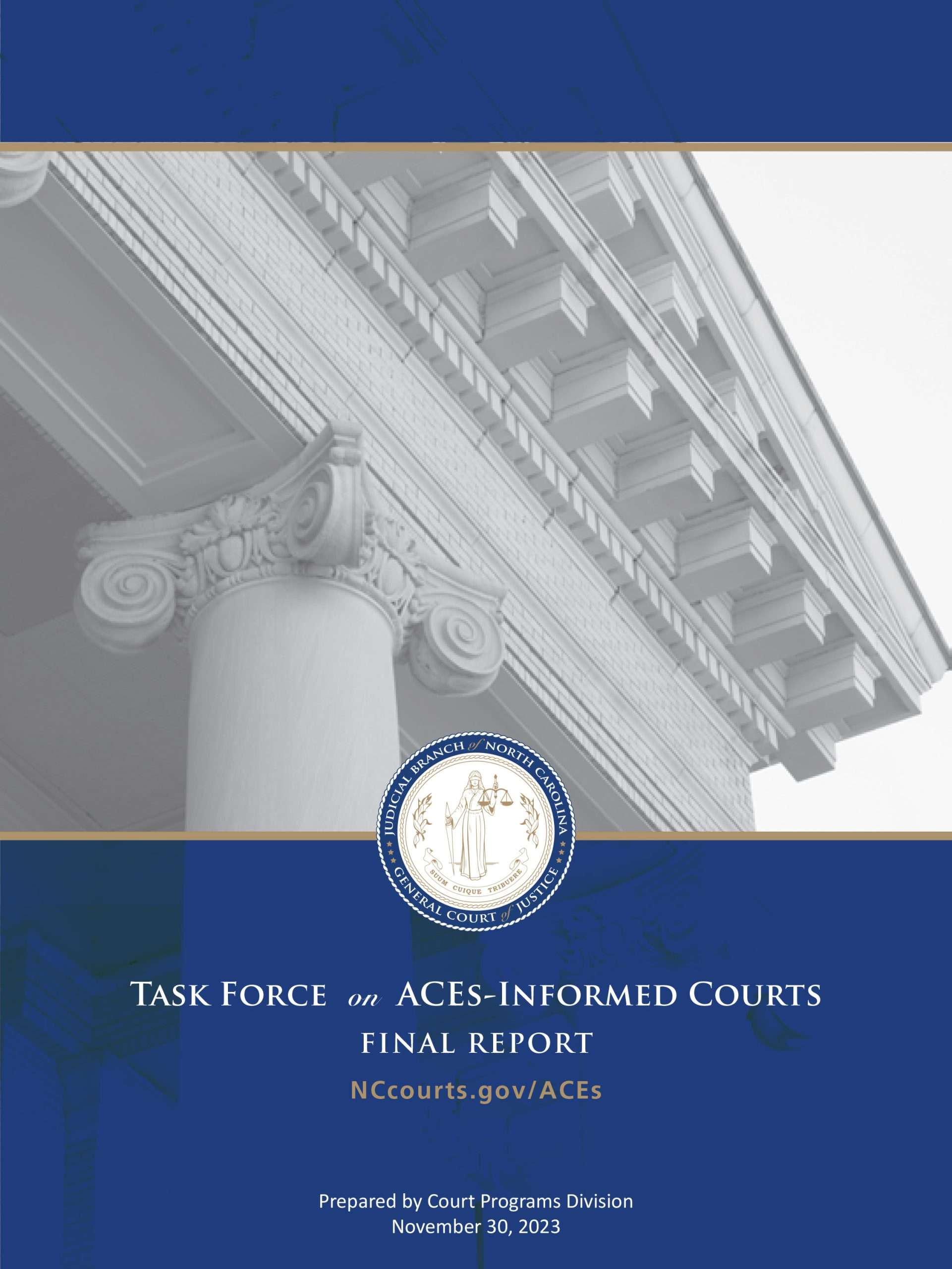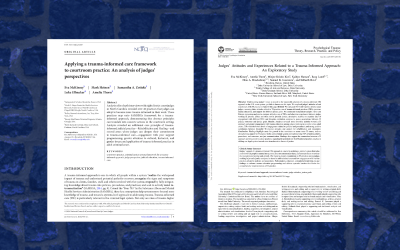Trauma Education for the Bench, Administrators, and Counsel
The Bolch Judicial Institute at Duke Law is a national leader in education and research relating to the use of trauma-informed practices in court. Among other initiatives, the Institute created North Carolina’s first-ever trauma-focused training for all new district court judges as part of new judges orientation, co-authored a bench card on trauma-informed practices with the Chief Justice’s Task Force on ACEs-Informed Courts, and launched a large-scale research project investigating the use of trauma-informed practices in juvenile delinquency courts. The Institute also travels to other states to offer educational programs to judges and administrators on trauma-informed practices and systems-level change. Contact amelia.thorn@law.duke.edu for more information on the Institute’s work in trauma education and trauma research.
Why Focus on Courts?
The Institute brings trauma education to judges—and focuses on the courts as a source of research—for three primary reasons:
- Trauma can lead to legal involvement: The impact of trauma on the brain, body, and behavior — such as reduced activity in the prefrontal cortex and the development of harmful coping mechanisms — may increase the likelihood of trauma survivors engaging in violent or criminal behavior (Fox et al., 2015; Kar, 2018; Kim & Choi, 2020; McCord, 1983), which can lead to interaction with the legal system.
- The court process itself can be traumatic: Legal proceedings and the actions of legal professionals can either cause or intensify traumatic stress. Individuals accused or convicted of crimes, particularly those with marginalized identities, may face abuse or harassment by legal personnel (Listwan et al., 2010; Stotzer, 2014). Crime victims and survivors may also experience re-traumatization due to victim-blaming, dismissive attitudes, or being forced to confront their abusers in court (Campbell, 2005; Epstein & Goodman, 2019; Katirai, 2020).
- Court professionals often face secondary trauma: Those working in the criminal justice system, such as judges and attorneys, experience some of the highest levels of secondary trauma among service professionals due to their frequent interactions with trauma survivors and the need to uphold confidentiality, which limits their ability to process these experiences (Jaffre et al., 2009; Levine et al., 2011).
Education Initiatives
The Institute’s trauma-informed courts curriculum helps judges, court officers, and court administrators understand the nature of juvenile trauma, the origin and lasting effects of trauma and toxic stress, intergenerational trauma, the connection between trauma and addiction, approaches to mitigating stress and establishing coping strategies, and other essential knowledge. The course also offers concrete practices judges might adopt in order to better interact with affected parties, particularly juveniles, read and understand trauma assessments, and craft trauma-informed orders.
All trainings include at least two perspectives—the scientific and the judicial—with doctors describing the effects of trauma on the brain and body along with its connection to court-involvement, and judges offering concrete strategies to help address trauma in the courtroom. Longer programs may include perspectives from other legal actors, like district attorneys and public defenders, as well as stories from those with lived experience in the system, along with opportunities for practice through hypothetical courtroom scenarios. Trainings can also address approaches to system-wide change and administrative approaches to creating more trauma-informed courts.
Contact amelia.thorn@law.duke.edu if your court is interested in a training.
Past and upcoming trainings include:
- Pilot Program: In 2021, the Institute partnered with the North Carolina Administrative Office of the Courts to create and administer an educational pilot program for about a dozen district court judges. The judges in attendance hailed from both urban and rural counties, and represented a range of judicial experiences and prior encounters with trauma education. Months after the program, judges were systematically interviewed about their perspective on the program and their implementation of the practices offered in the training. Findings are published in Judicature, with an additional article in a scientific journal forthcoming.
- New Judges Orientation: In Summer 2023, the Institute again partnered with the North Carolina Administrative Office of the Courts to provide the first-ever trauma-focused program to all new district court judges as part of the state’s new judges orientation program. Judges heard from doctors, judges, attorneys, and former defendants about approaches to trauma-informed practice in the courtroom. Results from surveys administered at orientation is forthcoming.
- Program for Chief District Court Judges: In Fall 2023, the Institute will host a combined meeting of the Task Force and all district court chiefs in the state, providing the latter group with two days of education on trauma-informed courts. The program marks the first intensive training on the topic for these court leaders as well as an opportunity for them to gain exposure to the work of the Task Force.
- Out-of-State Trainings: The Institute continues to offer similar trainings in other states to judges involved in both juvenile and adult courts, most recently in Arizona.
- Trauma-Informed Lawyering: The Institute offered Duke Law’s first trauma-focused lawyering course as part of a Wintersession course in early 2024. Wintersession offers students an opportunity to focus on a topic of practical interest in a brief, intensive setting, emphasizing hands-on, experiential learning. The course offered an overview of the science behind trauma, advice on how to work with clients who have experienced trauma, and approaches to address vicarious trauma in the workplace.
Research Initiatives
The Institute and its research team have engaged in three primary approaches to investigate trauma-informed practices in the North Carolina courts:
- Data Collection from Judges: The team interviewed judges who participated in a pilot trauma educational program. Read Trauma-Informed Judicial Practice from the Judges’ Perspective from Judicature Vol. 106 No. 2 (2022) to learn about judges’ views of trauma education and trauma-informed judicial practice. Further details on these interviews are also published in Applying a trauma-informed care framework to courtroom practice: An analysis of judges’ perspectives, in the Juvenile and Family Court Journal (full text available upon request). The team additionally surveyed nearly 100 district court judges about their perspectives on trauma-informed care and administered an evaluation survey to judges following a trauma education program. The results of the survey are published in Judges’ Attitudes and Experiences Related to a Trauma-Informed Approach: An Exploratory Study, in the journal Psychological Trauma: Theory, Research, Practice, and Policy (full text available upon request).
- Court Observations: The team traveled around the state to observe the use of trauma-informed practices in juvenile delinquency courts, observing 201 hearings across 35 court visits and 16 judges in 7 counties. The observations offer a wealth of data on courthouse environment, demographics of participants, and judges’ interactions with parents and children, among other measures.
- Surveys about Youth Experience: The team surveyed youth who appeared before the judges observed and court personnel who worked with those youth to get a sense of their experiences in court. We linked this survey data with observation data to assess the relationship between judge in-court behavior and youth experience in court.
Dr. Eva McKinsey, a social and community psychologist whose work focuses on trauma-informed practice in the criminal legal context, serves as the primary research consultant on the project. She has served as a trainer and consultant for various educational programs as well.
It is also supported by a team of dedicated students working under a grant from Duke’s Bass Connections, a program that allows an interdisciplinary team of undergraduate and graduate students to work with professors on cutting-edge, socially oriented research projects.
Support
The program was initially funded by a grant from the HopeStar Foundation, which takes as its mission to ensure that all families with children aged prenatal to five are healthy, educated, and empowered. Since then, a wide range of sponsors, including Duke Bass Connections, NC IOLTA and the Society for the Psychological Study of Social Issues have funded various initiatives that form the basis of the project.
We continue to seek additional sponsors for this important work. For more information, to get involved, or to offer financial support, please contact Amelia Ashton Thorn, Assistant Director of the Bolch Judicial Institute, at amelia.thorn@law.duke.edu.
Click here to download the Final Report from the N.C. Supreme Court Chief Justice’s ACEs-Informed Courts Task Force.
Trauma-Informed Courts In The News
Trauma-Informed Courts Initiative Publishes Articles Highlighting Judicial Perspectives and Practices
The Bolch Judicial Institute of Duke Law School’s Trauma-Informed Practices in the Courts initiative has published two original research articles, providing valuable insights into judges’ attitudes and practices regarding trauma-informed care in the courtroom. “These...
“Trauma Informed Care In Court” wins 2024 Bass Connections Poster Competition
The poster Trauma-Informed Care In Court: An Exploratory Research Project (PDF) was recognized as the winner of the 2024 Bass Connections Poster Competition at the annual Bass Connections showcase event held on April 17, 2024, on Duke University’s campus. A panel of...
N.C. Supreme Court Chief Justice’s ACEs task force concludes work, issues final report
The N.C. Supreme Court Chief Justice Paul Newby’s Task Force on ACEs-Informed Courts issued its final report on November 30, 2023. Chief Justice Newby, a member of the Bolch Judicial Institute of Duke Law School’s advisory board, established the task force in March...



